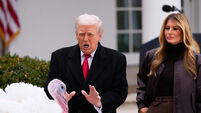US Elections: Joe Biden's Irish trump card

Democratic presidential candidate former Vice President Joe Biden speaks at a rally at the Iowa State Fairgrounds in Des Moines, Iowa. Picture: AP Photo/Andrew Harnik
During Lockdown, when most of the world was bingeing Tiger King on Netflix, Joe Biden was, by his own admission, reading Irish poetry. He revealed this in conversation with his granddaughter Finnegan who also happened to be reading Irish literature – but in the form of Sally Rooney’s Normal People and Conversations with Friends.
Biden’s Irish links run deep, with one great-great grandfather, Edward Blewitt emigrating from Ballina, Co Mayo during the Famine and his other great-great grandfather, Owen Finnegan emigrating from Co Louth at the same time. By way of his own mathematical calculation Biden considers himself a“5/8ths Irish in all”.
















